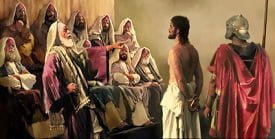Sunday: The Judean Example (1 Thess 2:13-16)
First Thessalonians 2:13-16 reads on the surface like a digression from the previous themes of pleasing God and caring for the new believers (1 Thess. 2:1-12). But verse 13 continues the theme of how the Thessalonians responded to the apostles and the gospel that they brought to Thessalonica. With verse 14, Paul returns to the theme of imitation. The persecution in Thessalonica echoed the earlier persecution of Christians in Judea. Some Jews persecuted Jewish Christians in Judea, while Gentile and Jewish neighbors together persecuted the largely Gentile Christians of Thessalonica. Here Paul shows that the persecution of Christians is tied to a larger pattern. Those who follow Christ are going to face opposition, even persecution.
Read 1 Thessalonians 2:14-16. What message should this passage have for us today? What does it definitely not teach?
Here Paul reveals his feelings about a specific group of Jews who dogged his evangelistic trail from place to place, sowing discord and opposition to the apostles. Passages in the Bible like this (see also Matt. 23:29-38) have been grossly perverted and twisted in order to “justify” persecution of Jewish people. But that kind of universal application goes way beyond Paul’s intention here. Paul was speaking specifically about the Judean authorities (the word translated as “Jews” in 1 Thessalonians 2:14 can also be translated as “Judeans”) who collaborated with the Romans in the death of Jesus and who made it their business to obstruct the preaching of the gospel wherever and whenever they could. In fact, Paul seems to be echoing what Jesus already said about those who were trying to kill Him (Matt. 23:29-36). We must keep in mind that Paul himself was a Jew. He was not vilifying an entire class of people. Jesus was Jewish. The first disciples were Jewish. Jews alone formed the early core of the church. As far as Paul was concerned, every Jew he met, like Silas, Barnabas, and Timothy, was potentially a friend for eternity (see Rom. 9:1-5; 11:1-12, 24-32). Every person on earth is a soul “for whom Christ died” (Rom. 14:15, 1 Cor. 8:11). Prejudice against whole classes of people is not appropriate among those who live at the foot of the cross. It’s easy to point fingers at the church for failure in regard to how it has treated whole classes of people. What about ourselves? How much ethnic prejudice lingers in our own hearts?


The Jews are often condemned for crucifying Christ, although it was actually the Romans. Can you imagine what would have happened if they hadn’t. WE WOULD NOT BE SAVED.
The debate will not end but those whose robes are finally washed in the Blood will discontinue it (the debate); the remaining group (as represented as the foolish virgins) will keep the discussion alive because the spirit behind it is about dissension among all who call on Christ’s name. When our focus become centered on our (individuality) sin being responsible for His death, we will repent and stay repented. As it is written, Godly Love works repentance; repentance then is a continual state of being and can therefore be defined thus: actively participating in the avoidance of sin.
I suppose that I must be one of the foolish virgins but to me actually everyone has had a part to play in Calvary one way or another. As for what happened 2000 years ago, the Romans wouldn’t have crucified Jesus except for the Pharisees charge against Jesus which they brought before Pilate whom they threatened politically with the charge of treason against Caesar. Pilate actually wanted to release Jesus (Jn 19:12) and when pushed into the political trap they set lashed out at them in frustration concerning the plaque on the cross, “What I have written, I have written” (Jn 19:22 NKJV). Besides, they didn’t kill Christ, nobody did directly, Jesus pulled the plug on His own life as the sacrificial offering typified in the evening burnt offering of the santuary services (Jn 10:17-18; Mat 27:45-51; see also Desire of Ages 756.5-757.1). If the Romans didn’t nail Him up someone else would have for it was prophesied to happen in order to complete the plan of salvation.
I think what is more important than who did what is the reason for the persecution. Certainly the devil was behind the whole thing but Jesus gives us a more surprising answer:
To me the very last part of the quote is the core of the problem. As Hosea wrote, “My people are destroyed for lack of knowledge. Because you have rejected knowledge, I also will reject you from being priest for Me; Because you have forgotten the law of your God, I also will forget your children” (Hos 4:6 NKJV). The law is the transcript of God’s character and that is what they rejected – knowledge of what God is like. They not only rejected that knowledge they also refused to be like God in character by keeping His law. Therefore, they became like animals and emulated their real master, the devil himself and placed themselves on his side against God.
Not only that but Jesus said that we will be persecuted for the same reasons and that, “the time is coming that whoever kills you will think that he offers God service” (Jn 16:2 NKJV). To me that means that they will get their marching orders through a complete misunderstanding of Scripture, especially what they think it says about God and what He expects of His people. As a warning we also must be very mindful of the fact that we too can fall for the same theological trap (1 Cor 10:12; Mat 23:29-30) and end up doing things that are completely out of harmony with Christ.